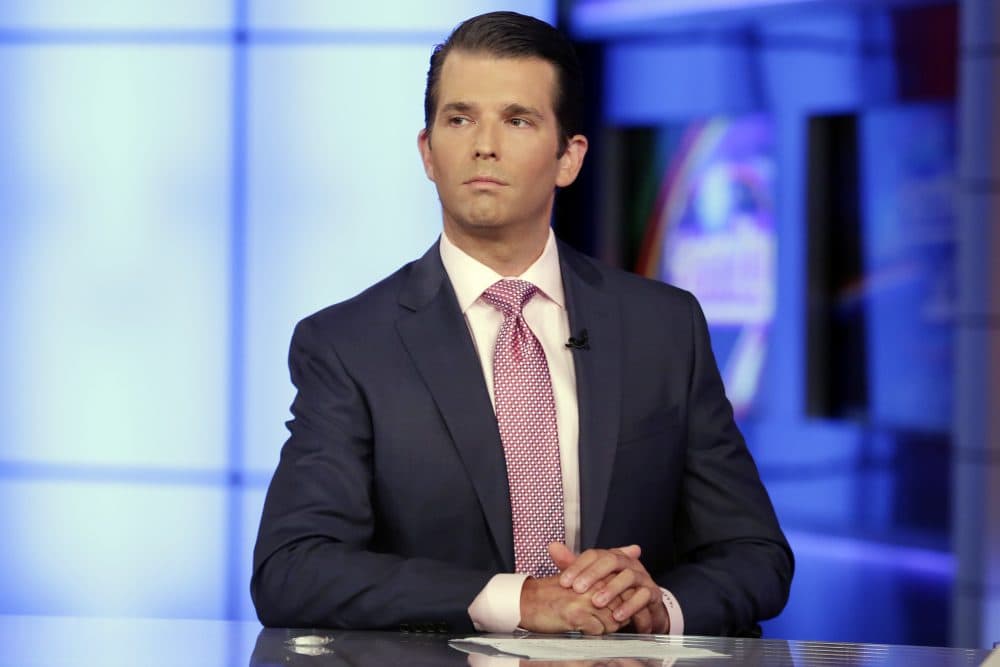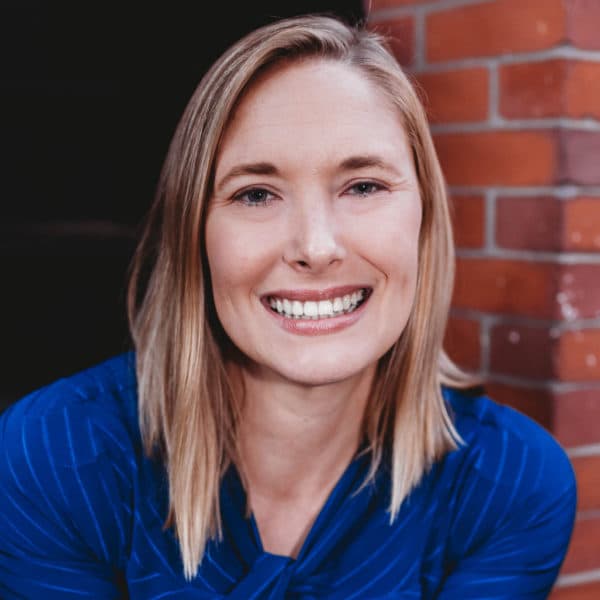Advertisement
Donald Trump Jr.'s Emails And The Collusion Question
Resume
This week on Freak Out And Carry On, Ron Suskind and Heather Cox Richardson speak with Adam Liptak, legal correspondent for The New York Times. They react to the news, revealed in published emails, that Donald Trump Jr. met with a Russian lawyer who promised incriminating documents on Hillary Clinton. They also push back on the suggestion, from Sen. Tim Kaine, (D-Va.), that the meeting was treasonous.
Excerpts
Heather Cox Richardson: My first take, I think, is "Wow." But I think the real takeaway for me to start today's podcast is to say this is not normal. This is a moment that we have never seen before and it's not OK. That's not to say it's irrecoverable and that America can't respond to this, but it is important to remember that this is not the way the American government is supposed to operate, and we have to grapple with that as we move forward.
Ron Suskind: Look I'm not going to put Russia in with Al-Qaeda, but let me just offer one little nugget here. In the 2004 campaign with John Kerry and George W. Bush, Osama Bin Laden sent out a video right before the election that clearly advantaged George W. Bush. People were affronted. Why would he hand Bush a gift like that? That's what they said in the CIA. This is as though the Bush campaign went to Bin Laden and said please produce video that's going to help us — or even better Bin Laden called up Bush through intermediaries and said, "We're going to do you a big favor."
Adam Liptak, The New York Times: Donald Trump Jr. took that meeting cheerfully and in the hope that he would get this material, and even recently was saying he was unhappy about the fact that, he says, it didn't come through. So this was at the least attempted collusion. Well if there was no collusion it wasn't for want of trying on the part of his son, who invited the campaign chairman Paul Manafort and his brother-in-law Jared Kushner. So these were not fringe characters, this is a blood relative, a son-in-law, a campaign chairman sitting down with someone they understood to be representing the Russian government. And some people's impulse on hearing such an offer might be to call the FBI. These people's impulse was, "Let's see what we can find out."
Suskind: Adam, Democratic senator from Virginia Tim Kaine, Hillary's running mate, is using the "T" word here, treason.
Liptak: My own view is that's getting ahead of ourselves. It's not unusual for campaigns to try to get disparaging material about their adversaries. It does strike me as unusual to turn to foreign sources but that's not the traditional definition of treason. I certainly don't think it would pass any kind of legal, prosecutable definition of treason.
Richardson: Well, Adam had a good point there though, about whether or not this is treason. The legal definition of treason is deliberately kept very, very small in this country.
Suskind: What examples do we have that you can cite of treason?
Richardson: Well, you know there aren't very many, interestingly enough. The last person that was convicted of treason in America came out of World War II. It was a Japanese-American citizen named Tomoya Kawakita. There's a reason it's very hard to convict somebody of treason against the federal government. It's really easy to expand the definition of treason to include political opponents. Political opponents who might've gotten opposition research in ways that we do consider legitimate, or political opponents who simply don't like the current administration for one reason or another. And it was Justice John Marshall at first, in the Aaron Burr trial, who pulled back on definitions of treason and said we have to be really, really careful about this and make sure we don't expand it too far. If you start to do that you start to impinge on civil liberties, and people who are now hitting really hard on the idea that this is treason, and they want to see this be interpreted as treason, should be remembering that you don't always want to expand the definitions of crimes against the federal government because the first things to go are civil liberties.
Liptak: Serious people think that campaign finance laws may well have been violated here. It's a crime for a foreign national to try to influence an election, including through making contributions of anything of value, and you can ask the question of whether opposition research, for which people will pay money, is a thing of value. So that's another kind of way to think about it if you want to get legalistic about it. I think what the framers probably contemplated is that if all of what you said is true and this leads to the president, and there's authentic collusion, that the House would impeach and the Senate would remove him. I'm not sure they contemplated a political dynamic of the sort we have today, although, you know, Republicans deserted Richard Nixon when things got ugly enough. And the second is the legal process, and we do have a special prosecutor investigating obstruction of justice and collusion. Most legal scholars say that a sitting president cannot be indicted, although there's not been a definitive ruling on that. It may be that whatever the special prosecutor comes up with he has to — he'll decide to refer to the House rather than to take it to court. But that's a contested question about whether you can indict, perhaps indict now and wait for the president to leave office before concluding the prosecution. But those are the two basic routes: impeachment and formal prosecution.
Suskind: Heather, looking at Donald Trump Jr.'s emails, what can history teach us?
Richardson: You know in the early years of America, we tend to forget that the North American continent had a number of different European nations jockeying for power. And America had to sort of carve itself a space out of all that and maintain its sovereignty. And George Washington and the president who followed him, John Adams, worked at doing that so intently that a lot of their opponents started to think that they'd forgotten about democracy, that they were too concerned about shoring up American power and not concerned enough about the people. And what happens is you get the rise of a political party really forming around people like Thomas Jefferson to say, "No, no, no, no, we're about democracy, we're about the people." And after the French Revolution, when the French people throw off the monarchy in 1793, it seems to those Americans who like democracy and who really believe in the power of the people that they've finally found a wedge issue to get back at the Federalists in power and to make sure that democracy really takes over in America. And what they do is they start to pressure America to maintain its alliance with France, because of course France helped us dramatically during the American Revolution, and instead of turning towards Britain as the Federalists under Washington and then Adams were increasingly doing, to turn to France. This fairly minor politician from Pennsylvania, a guy named George Logan, decides to go to France and cut his own deal with France. And while he's over in France negotiating this deal, the Federalists back home say, "No! No, we have to have one policy for America. We have to let Americans run their own country, and we have to have politics stop at the border." And while he is overseas they pass what is known as the Logan Act, and what that does is it says that Americans keep our domestic politics on our continent. And whether or not what is going on right now violates the Logan Act — it will certainly come up, people will talk about it — but I think importantly here that we are in territory, for a political party to turn like this to another country for opposition research to swing an election, is unprecedented. Except perhaps in the years before 1799 with the Logan Act, and when that happened as I say it was a Quaker from Pennsylvania who was a minor-level politician. We are in waters we have never been in before.
So Ron, what do you think are the unanswered questions, you know, what is still not passing the smell test here and needs to be ferreted out?
Suskind: Well look, I would first go at this meeting. I don't buy what they're saying, that nothing occurred in this meeting, there was no yield of valuable information. It doesn't make sense. Lots of set-up for this meeting. It's happening right in the Trump Tower during an intense period in the U.S. electoral cycle. The idea that this Natalia Veselnitskya would meet with the Trump triumvirate of Kushner, Donald Jr., and Paul Manafort and deliver nothing doesn't add up. There's more there.
Richardson: And President Trump maintained that he didn't know about the meeting.
Suskind: Yeah, I mean the idea that his son, his son-in-law and his campaign manager are meeting feet, literally if you just use the ceiling versus the floor, feet beneath where Donald is sitting and he knows nothing about it. In the middle of the heated campaign. I mean talk about not passing the smell test.
The views and opinions expressed in this podcast are solely those of the participants and do not in any way reflect the views of WBUR management or its employees.
